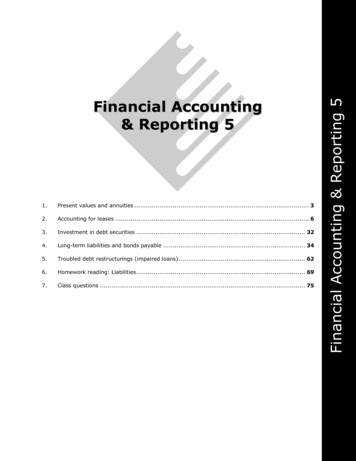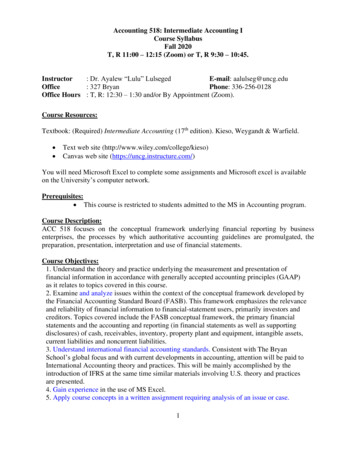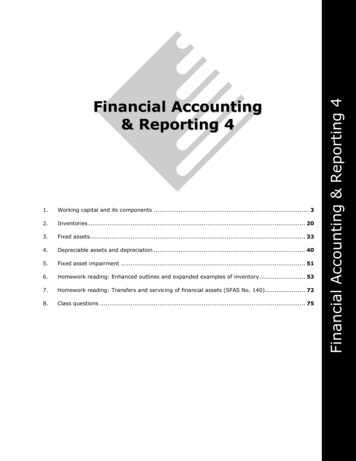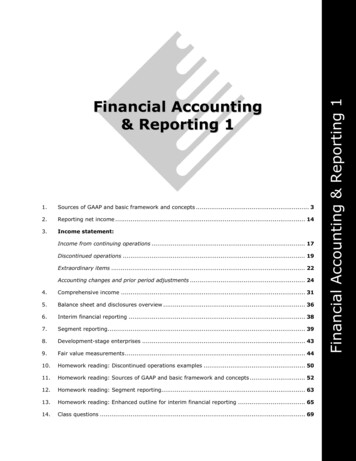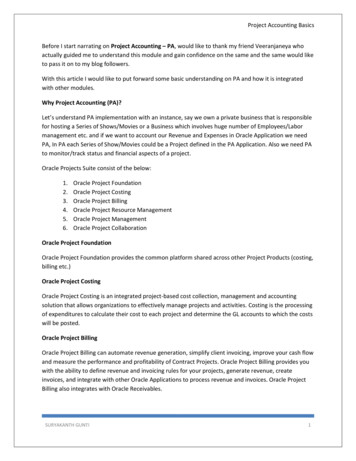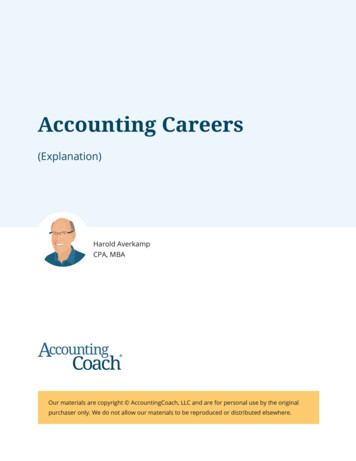
Transcription
Accounting Careers(Explanation)Harold AverkampCPA, MBAOur materials are copyright AccountingCoach, LLC and are for personal use by the originalpurchaser only. We do not allow our materials to be reproduced or distributed elsewhere.
Accounting Jobs and OpportunitiesIntroduction to Accounting Jobs and OpportunitiesWhat is a Bookkeeper?What is an Accounting Clerk?What is an Accountant?What is a Certified Public Accountant (CPA)Accounting Jobs at CPA FirmsCorporate Accounting JobsGetting Hired33568111212Accounting DegreesIntroduction to Accounting DegreesTwo-Year Associate Degree in Accounting1415Four-Year Bachelor’s Degree with a Major in Accounting150-Credit Degree for the CPA ExamChoosing a College or University151617CPA RequirementsIntroduction to CPA RequirementsEducation RequirementsPassing the CPA ExamEthics ExamExperience RequirementsCPA License RequirementsOrganizations for CPAs19192121212222CPA ExamIntroduction to the CPA ExamDifficulty of the CPA ExamCPA Exam FactsCPA Exam Review Courses and Materials23232424CMA and Other CertificationsCertified Management Accountant (CMA)CMA Exam Review Courses and MaterialsAccounting-Related Certifications and Credentials262627For personal use by the original purchaser only. Copyright AccountingCoach .com.2
Introduction to Accounting Jobs andOpportunitiesThere exists today a wide range of job opportunities in the field of accounting.Entry-level jobs are dependent on the extent of your education. Positions of bookkeeper andaccounting clerk, for example, require a high school diploma and perhaps a two-year associatedegree in accounting. The position of accountant demands that you have a more thoroughunderstanding of financial concepts and typically requires a minimum of a four-year bachelor’sdegree in accounting. Some accountants go on to become certified public accountants (CPAs)as this provides more job opportunities. To become a CPA today, you will likely need to have 150college credits including a degree in accounting, have professional accounting work experience, andpass the rigorous CPA Exam.For purposes of our discussion, we’ve classified accounting jobs into four categories: Bookkeeper Accounting Clerk Accountant Certified Public AccountantFor each category, we’ll present some general information on salary, educational requirements, andtypes of employment opportunities.What is a Bookkeeper?Annual Salary RangeFull-time: 27,000 to 45,000 The salary range reflects differences in job responsibilities, the size and type of employer, and thesupply and demand for bookkeepers in a given geographic area. General salary information isavailable at the U.S. Bureau of Labor 1.htmFor personal use by the original purchaser only. Copyright AccountingCoach .com.3
Educational RequirementSome bookkeepers enter the work force with a two-year associate degree in accounting, whileothers enter with a high school diploma and an expectation that the employer will provide onthe-job training. If you are hired as a bookkeeper, you should assume that you will need someexperience (either formal or on-the-job) in the use of accounting software. Generally, bookkeepersare not expected to have a four-year degree in accounting.Note:If you are new to bookkeeping or need a refresher, AccountingCoach offers explanations,video training, practice quizzes, quick tests, Q&A and 10 certificates of achievement for topicssuch as: Debits and credits Adjusting entries Financial statements Payroll accounting Bank reconciliation Financial ratios, and moreAll are included in AccountingCoach PRO Plus.We also recommend you use other online resources to become familiar with QuickBooks andelectronic worksheets.Who Hires Bookkeepers?Bookkeepers are typically employed by companies that do not need or have the means toemploy an on-staff accountant. These companies hire a bookkeeper to handle a range of routinefinancial activities, such as payroll, billing, and purchases. (Small manufacturers, retail stores,distributors, large law offices, small accounting firms, and not-for-profit entities are examples ofsuch companies.) When some tasks require an accountant, the company typically contracts with anoutside accounting firm for the services it needs.Types of Tasks and ResponsibilitiesEffective bookkeepers are detailed-oriented, accurate, and efficient with a range of basic financialtasks. A bookkeeper is expected to handle large volumes of routine financial transactions in areassuch as sales, purchases, and payroll and to generate/handle the documents associated withthese transactions. For example, a purchase made by a company may include a purchase order, aFor personal use by the original purchaser only. Copyright AccountingCoach .com.4
receiving ticket, the supplier’s invoice, and payment to the supplier. A bookkeeper’s duties may alsoinclude the generation of internal financial reports.A bookkeeper’s work may be reviewed by someone inside the company, or by an accounting firmcontracted by the company.Future NeedsThe affordability of computers and software means that employers will seek bookkeepers who areproficient in accounting/business software. With new technologies and software, small businesseswill give preference to hiring bookkeepers who can adapt to changes in computing systems.What is an Accounting Clerk?Annual Salary RangeFull-time: 27,000 to 45,000 The pay range reflects differences in job responsibilities, the size and type of employer, and thesupply and demand for accounting clerks in a given geographic area. General salary information isavailable at the U.S. Bureau of Labor 1.htmEducational RequirementSome accounting clerks enter the work force with a two-year associate degree in accounting, whileothers enter with a high school diploma and an expectation that the employer will provide on-thejob training. Generally, accounting clerks are not expected to have a four-year degree in accounting.Types of Tasks and ResponsibilitiesCompanies large enough to have one or more accountants on staff are the companies that also hireaccounting clerks to assist the accountants with routine tasks. Whereas a bookkeeper is expectedto perform a range of basic financial tasks, the accounting clerk, payroll clerk, accounts payableclerk, accounts receivable clerk, inventory clerk, and cost accounting clerk will have more focusedresponsibilities.For personal use by the original purchaser only. Copyright AccountingCoach .com.5
For example, the duties of an accounts payable clerk at XYZ Company may be to compare theinformation on each supplier’s invoice to the information on XYZ’s corresponding purchase orderand receiving ticket. If the information on these documents is consistent, the supplier’s invoice issent forward for payment. If the information is not consistent, the differences must be resolvedbefore payment can occur.What is an Accountant?Annual Salary RangeFull-time: 40,000 to 80,000 The salary range reflects differences in job responsibilities, the size and type of employer, and thesupply and demand for accountants in a given geographic area.Educational RequirementAccountants are expected to have a bachelor’s degree in accounting from a four-year college oruniversity. Of the 120 semester credits needed for the degree, approximately 30-36 of these creditswill be in accounting courses such as introductory, intermediate, and advanced financial accounting,cost accounting, income tax, auditing, and accounting systems. Also required within the 120 creditsare business courses such as organizational behavior, human resources, marketing, businessstatistics, computer systems, business law, economics, and administrative policy.While a bachelor’s degree in accounting will qualify you to be an accountant, it will not meet today’srequirements for becoming a certified public accountant (CPA). That is why some colleges anduniversities now offer both an accounting major as well as a 150-credit degree program or mastersdegree that qualifies you to take the CPA Exam.Membership AssociationsAccountants can join national organizations with local chapters such as the Institute of ManagementAccountants, Institute of Internal Auditors, Accounting & Financial Women’s Alliance, NationalAssociation of Black Accountants, and others.Who Hires Accountants?Many companies are sufficiently large and complex to require the ongoing expertise of an in-houseaccountant. As an accountant, you may find yourself working for a manufacturer, hospital, bank,For personal use by the original purchaser only. Copyright AccountingCoach .com.6
insurance company, brokerage firm, or any one of the many other types of businesses. Accountantsare also employed by U.S. government agencies such as the Internal Revenue Service (IRS), FederalBureau of Investigation (FBI), Securities and Exchange Commission (SEC), and the GovernmentAccountability Office (GAO). State government agencies and large not-for-profit organizations alsohire accountants.Tasks and ResponsibilitiesBeing proficient in finance and accounting is just one dimension of being a successful accountant.Therefore, an employer strives to hire an accountant who, in addition to demonstrating excellentaccounting skills, also possesses the following traits: Pays close attention to details, but does not lose sight of how details affect the bigger picture Is a problem solver and a strategic thinker Has a productive curiosity about business systems (why a company is profitable, how itattracts new customers, etc.) Has good listening skills Can communicate complex financial information in a clear, straightforward manner Works well as a member of a team Can supervise and develop subordinatesSome accountants are generalists, while others prefer to specialize in a given area. For example, ifyou are hired as a cost accountant (or cost accounting manager) at a manufacturing company, youmight supervise several cost accounting clerks who calculate the costs of products manufactured,prepare cost estimates for potential sales of new products, and monitor the cost of raw materials,labor, and overhead.Or, you might be responsible for maintaining the general ledger and preparing financial statementsthat comply with generally accepted accounting principles. In this role you might supervise anaccounts payable clerk and payroll clerk, and your title might be general ledger accountant, chiefaccountant, corporate accountant, accounting manager, or corporate controller.At larger and more complex companies, some accountants may have titles such as internal auditor,coordinator of profit plans and budgets, researcher of accounting and tax issues, financial analyst, or taxaccountant.Future NeedsAs the world becomes more interconnected via global systems and international commerce, theneed increases for accountants to be knowledgeable in international accounting standards as wellas new technologies that assist management in making decisions. In short, accountants will need toFor personal use by the original purchaser only. Copyright AccountingCoach .com.7
be life-long learners who work closely with people in marketing, production, information technology,and e-commerce.What is a Certified Public Accountant (CPA)Annual Salary RangeFull-time entry level: 50,000 to 65,000Full-time with several years of progressive experience: 100,000 The entry-level salary range will vary by industry, geographic location, and other factors. You canobtain more detailed information concerning starting salaries from the career services or placementoffice of the college or university that you plan to attend.Increases in annual salary will depend on your professional growth. If you are an effectivesupervisor, work well with fellow employees and clients, and know how to improve profits, yoursalary increases can be significant. Annual salaries of experienced CPAs can be in excess of 100,000. Some CPAs with more than 10 years of continuously increasing responsibility can earnmore than 200,000 per year.Educational RequirementMost state boards of accountancy now require that CPA candidates have a minimum of 150 collegecredits of which some must be in specified accounting and business courses before they are allowedto sit for the Uniform CPA Examination. (Check with your own state’s board of accountancy todetermine what the requirements are. If you do not meet your state’s requirements, you will not beallowed to sit for the CPA Exam.) Reputable colleges and universities will have accounting programsdesigned to meet their state’s requirements.Because the CPA Exam is very rigorous, you should select a college or university with a rigorousaccounting program that will prepare you for the challenge.Other RequirementsAfter you’ve passed the CPA Exam, most state boards of accountancy require you to have aminimum of one year of professional accounting experience and pass an ethics test before you canbe licensed as a CPA. Once licensed, you will be required to earn professional continuing educationcredits to maintain your license. Again, check with your own state’s board of accountancy forspecifics.For personal use by the original purchaser only. Copyright AccountingCoach .com.8
Find your State Board of AccountancyMembership AssociationsIn addition to the organizations targeted to non-CPA accountants, a CPA is eligible to join its statesociety of CPAs and the American Institute of Certified Public Accountants (AICPA).Who Hires CPAs?Before you can become a licensed CPA, you must pass the CPA Exam, and acquire the necessarywork experience. Fortunately, some companies will hire a newly graduated accounting major whohas the ability and intention to become a CPA. Such employers recruit students who graduate withhigh grade point averages from well-respected accounting programs, since they are most likely topass the challenging CPA Exam.Major employers of CPAs (and soon-to-be CPAs) include: CPA firms. These range from a small one-office firm, to regional multi-office firms, to largeinternational firms with offices in major cities throughout the world. Companies such as manufacturers, banks, insurance companies, government agencies, largenot-for-profit organizations, e-commerce, and many more.Tasks and Responsibilities during the First Year at CPA FirmsIn order for a CPA firm to be profitable, its CPAs must be highly focused individuals who cansuccessfully complete tasks within a reasonable amount of time. CPAs are often billed out to clientsusing a per-hour billing rate, and clients will not pay high fees for CPAs who spend an unreasonableamount of hours completing the necessary tasks.Some larger CPA firms assign newly hired college graduates to work in their tax departments oradvisory services area. More common, however, is for firms to start new hires in the auditing areawhere they audit a client’s records with a team comprised of a supervising or senior accountant, amanager, and one of the firm’s partners.Smaller CPA firms generally perform relatively few audits, resulting in a more varied workload forthe new hire. Responsibilities in a smaller CPA firm might include: reviewing a business client’sfinancial statements, assisting with the client’s accounting system, preparing a business tax return,preparing the business owners’ personal tax returns, and tax planning.Most CPA firms find their busiest season to be the months of January through April. The reasonFor personal use by the original purchaser only. Copyright AccountingCoach .com.9
for this is that many clients are businesses with an accounting year ending on December 31.As a CPA, you would prepare and audit annual financial statements for business clients duringJanuary, February, and March. Additionally, clients who are individuals will need their personal taxdocuments completed by the IRS deadline of April 15. Some CPA firms try to “smooth out” theirannual workload by adding clients with fiscal years that end in months between May and October.For example, school districts and some businesses and nonprofits have accounting years that endon June 30.If you are a recent hire who is planning to take the CPA Exam, the less busy months of May throughDecember will be more conducive for studying for the exam.After the First Year at CPA FirmsAfter one year at a CPA firm, you may be assigned to work with new clients as well as the clients youknow from your first year. The firm’s goal is to deepen and broaden your range of experiences whileoffering clients efficient and professional service. Each subsequent year you are with the firm, youcan expect more and diverse responsibilities in areas such as audit planning, supervising the work ofother auditors and accountants, increased client contact, and additional training.Tasks and Responsibilities at non-CPA FirmsNot every CPA wants to work as a public accountant. Some prefer to be employed as accountantsfor companies involved in e-commerce, manufacturing, banking, insurance, or government agencies,or not-for-profit organizations. These accountants may have obtained their CPA license for morework options, or to distinguish themselves from others.Some CPAs may choose to specialize. For example, in large international corporations whose stockis publicly traded, external reports must be provided to stockholders, the SEC, and the IRS. Eachof these requires compliance with unique reporting standards. Some CPAs enjoy the intellectualchallenge and satisfaction in keeping current and complying with new and often complex reportingstandards.Many accounting graduates begin their careers in public accounting, gain valuable experience,obtain their CPA license, and then leave public accounting. Some will work for businesses or notfor-profit organizations, some become entrepreneurs, and others gain additional education andbecome accounting professors.Future NeedsAs the world becomes more interconnected via global systems and international commerce, theneed increases for CPAs to keep current with both domestic and international accounting standards.CPAs must also keep current with new technologies that assist management in making decisions.For personal use by the original purchaser only. Copyright AccountingCoach .com.10
Accounting Jobs at CPA FirmsBelow is a table that provides some examples of the accounting job opportunities at large and smallCPA firms:CategoryExamplesof FirmsServices Provided by Eachof the Firms ShownCommon Titles ofAccounting DegreedEmployeesBig 4DeloittePwCErnst & YoungKPMGAttestation & AssuranceTaxIT/SystemsInternationalAdvisory Services (successionplanning, mergers andacquisitions, etc.)Data analyticsForensicStaff AccountantJuniorSeniorSupervisorManagerSenior ManagerPartnerManaging PartnerNext tier oflargest firmsRSMGrant ThorntonBDOAttestation & AssuranceTaxIT/SystemsInternationalAdvisory Services (successionplanning, mergers andacquisitions, etc.)Data analyticsForensicStaff AccountantJuniorSeniorSupervisorManagerSenior ManagerPartnerManaging PartnerRegionalU.S. firmsAttestation & AssuranceTaxIT/SystemsAdvisory Services (successionplanning, mergers andacquisitions, etc.)Data analyticsForensicStaff AccountantJuniorSeniorSupervisorManagerSenior ManagerPartnerManaging PartnerLocal U.S.FirmsAttestation & AssuranceTaxIT/Systems/QuickBooksAdvisory Services (successionplanning, mergers andacquisitions, etc.)Data analyticsForensicPersonal Financial PlanningStaff AccountantJuniorSeniorSupervisorManagerSenior ManagerPartnerManaging PartnerSole or SoloPractitionersAttestation & AssuranceTaxPersonal Financial PlanningAccounting & Payroll ServicesQuickBooks advisingFor personal use by the original purchaser only. Copyright AccountingCoach .com.11
Corporate Accounting JobsBelow is a sampling of the various accounting positions found in corporate accounting:ClassificationCommon Titles ofAccounting DegreedEmployeesC
Bookkeeper Accounting Clerk Accountant Certified Public Accountant For each category, we’ll present information on salary, educational requirements, and types of employment opportunities. What is a Bookkeeper

